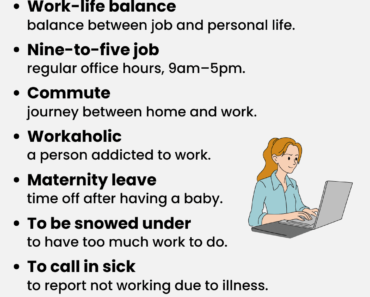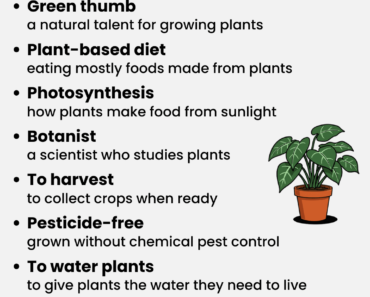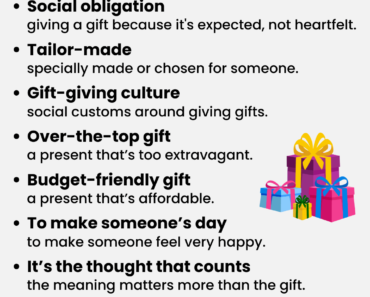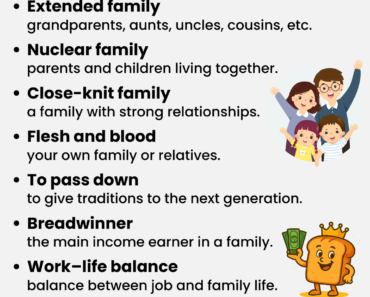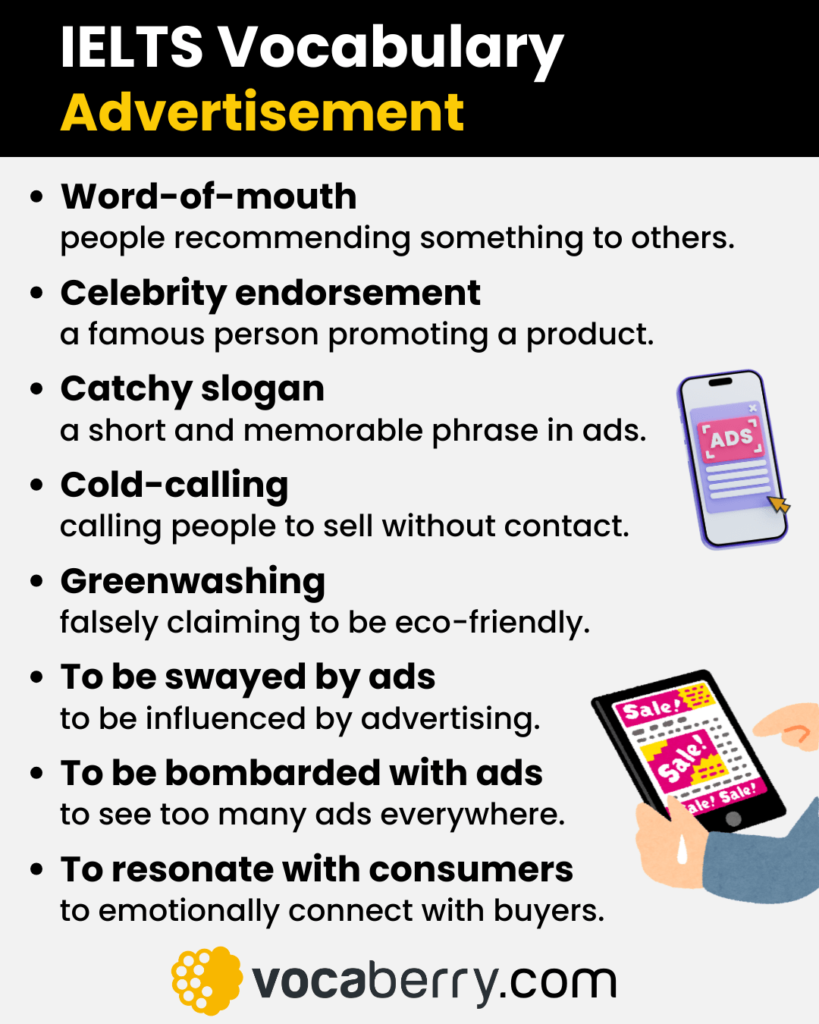
Advertisement is a common topic in the IELTS Speaking test. Examiners may ask you about your opinion on advertising, the types of ads you see often, or how advertisements influence consumer behavior. In this guide, you’ll find useful IELTS vocabulary for advertisement with clear definitions, followed by IELTS Speaking Part 1, Part 2, and Part 3 questions with sample answers.
IELTS Vocabulary for Advertisement
Here is some useful IELTS vocabulary for talking about advertisements with clear definitions. These words and phrases will help you give better answers in the IELTS Speaking test.
- Advertisement (ad) – a message that promotes a product or service.
- Commercial – a short promotional ad on TV, radio, or online.
- Billboard advertising – large outdoor advertising on roads or buildings.
- Banner ad – a rectangular online ad on a website or app.
- Pop-up ad – an online ad that appears suddenly on a screen.
- Flyer – a small printed sheet used to advertise something.
- Viral marketing – advertising that spreads quickly via social media.
- Telemarketing – selling products or services over the phone.
- Word-of-mouth – promotion through people’s personal recommendations.
- Celebrity endorsement – when a famous person promotes a brand.
- Target audience – the group of people an ad is aimed at.
- Brand awareness – how familiar people are with a brand.
- Brand loyalty – when customers keep buying the same brand.
- Brand image – the general perception of a brand.
- Wordplay – clever use of language in slogans.
- Jingle – a short, catchy song used in ads.
- Catchy slogan – a short, memorable phrase used in advertising.
- Eye-catching design – visually attractive content that grabs attention.
- Persuasive message – a message aimed at convincing people to buy.
- Advertising campaign – a series of connected promotional ads.
- Marketing strategy – a plan for promoting and selling products.
- Product placement – showing a brand in a film or TV show.
- Social media influencer – a person who promotes brands online.
- Target market – the specific group a company wants to sell to.
- Tailored ads – ads personalized to your interests or online activity.
- Price war – aggressive competition between companies to lower prices.
- False advertising – giving misleading or dishonest product information
- Consumerism – the habit of buying and consuming goods excessively.
- Consumer behavior – how people make decisions about what to buy.
- Consumer rights – the rights people have when buying goods or services.
- Online shopping – buying goods through websites or apps.
- Digital marketing – promoting products through online platforms.
- Traditional advertising – ads through TV, radio, or newspapers.
- Email marketing – sending promotional messages via email.
- Influencer marketing – using influencers to promote products.
- Advertising budget – the money set aside for promotions.
- Advertising tactics – methods used to attract and persuade customers.
- Advertising ethics – moral rules in advertising.
- Misleading claims – false or exaggerated advertising statements.
- Market research – studying customer needs and preferences.
- Spam email – unwanted or irrelevant promotional emails.
- Flooded with spam – receiving too many unwanted emails.
- Call to action (CTA) – a message encouraging the audience to act.
- Emotional appeal – using emotions to make ads more persuasive.
- Advertising fatigue – when people become tired of seeing too many ads.
- Advertising clutter – the overload of ads that compete for attention.
- Hard sell – aggressive and direct advertising.
- Soft sell – subtle and gentle advertising.
- Subliminal message – hidden message intended to influence the mind.
- Hype up a product – to over-promote or exaggerate something.
- Mass marketing – advertising aimed at a broad audience.
- Niche marketing – targeting a very specific group of customers.
- Truth in advertising – promoting products honestly and accurately.
- Window dressing – making a product or service look better than it is.
- Greenwashing – falsely promoting a product as environmentally friendly.
- Buzz marketing – spreading excitement by word-of-mouth.
- Buying power – the ability of consumers to purchase goods or services.
- A household name – a brand or product everyone knows.
- Brand ambassador – someone who represents and promotes a brand.
- Advertising agency – a company that creates and manages ads for clients.
- Commercial break – a pause in a TV or radio show for ads.
- Cold-calling – calling people to sell without prior contact.
- Prime time – the most-watched time on TV or radio.
- Pay-per-click ads – online ads where advertisers pay only when users click.
- Click-through rate – the percentage of users who click on an ad after seeing it.
- To be swayed by advertisements – to be influenced or convinced by ads.
- To capture someone’s attention – to get someone to notice something.
- To generate a buzz – to get people talking and excited about something.
- To drive sales – to increase the number of products sold.
- To go/sell like hot cakes – to sell very quickly and in large amounts.
- To get on the bandwagon – to start doing something popular or trending.
- To entice someone – to tempt or persuade someone to act.
- To capitalize on something – to take advantage of an opportunity.
- To resonate with consumers – to emotionally connect with buyers.
- To endorse a product – to publicly support or promote a product.
- To attract customers – to make people interested in buying something.
- To manipulate consumers – to unfairly influence buying decisions.
- To exaggerate the benefits – to make something seem better than it is.
- To raise awareness – to inform people about an issue or product.
- To sponsor an event – to support an event for brand exposure.
- To be bombarded with ads – to see too many ads everywhere.
- To be influenced by advertising – to let ads affect your buying choices.
- To pester somebody for something – to annoyingly ask for something repeatedly.
IELTS Speaking: Advertisement Questions & Answers
In this section, you’ll find IELTS Speaking Part 1, Part 2, and Part 3 questions on advertisements with sample answers. These examples show how the advertising-related vocabulary can be used in your responses during the test.
IELTS Speaking Part 1 – Advertisement
Are you often exposed to advertisements?
Yes, definitely. These days, it’s hard not to be bombarded with ads, especially online. I see banner ads, pop-up ads, and even pay-per-click ads while browsing. It feels like advertisers track everything I search for and show me tailored ads all day.
Do advertisements influence your choices?
Yes, even when I don’t realize it. A good persuasive message or strong emotional appeal can definitely grab my attention. I’ve been swayed by advertisements just because of a clever catchy slogan or a celebrity endorsement that made the product seem more trustworthy.
Are there any ads you find annoying?
Absolutely. I really dislike pop-up ads, especially when I’m watching something or working. Also, when companies flood my inbox with spam or try cold-calling, it just pushes me further away from their product. It feels very intrusive.
What kind of ads do you find most effective?
I think word-of-mouth and buzz marketing are the most effective. When a friend recommends something, it feels more genuine. A creative ad with a strong call to action or clever wordplay often captures my attention and helps me remember the brand.
Do you trust advertisements you see online?
Not completely. Many of them use misleading claims or exaggerate the product. Some even practice greenwashing, which I find unethical. I usually look for real reviews before making a decision.
Why do you think companies spend so much on advertising?
Because they need to drive sales and stay competitive. With so many options out there, companies have to use marketing strategies like buzz marketing or emotional appeal to grab attention and increase brand loyalty.
IELTS Speaking Part 2 – Advertisement Cue Card
Describe an advertisement you remember well.
You should say:
- What it was for
- Where you saw or heard it
- What it was like
- And explain why you remember it so well.
Sample Answer:
One advertisement that really stood out to me was a digital marketing campaign I came across on YouTube. It was for a new eco-friendly detergent brand, and what made it memorable was how it combined a strong persuasive message with a touch of humor and emotion.
The ad popped up as a pay-per-click ad while I was watching a travel video. At first, I was tempted to skip it, like I usually do with most banner ads or pop-up ads, but this one immediately captured my attention with its eye-catching design and unusual opening. It showed a talking washing machine! It sounds silly, but the machine was explaining how most detergents harm the planet and how this new brand was different.
What really made it effective was its use of emotional appeal. It featured short clips of children playing in nature, paired with the slogan: “Clean clothes. Clean future.” It was a simple yet catchy slogan that stuck with me. The ad also used a well-known actor as a celebrity endorsement, which added a layer of trust. I later found out he was also their brand ambassador, which made the message seem even more authentic.
The company clearly knew their target audience, which was environmentally conscious young adults, and tailored the message perfectly. It was a great example of how market research and a solid marketing strategy can make a brand stand out in a sea of advertising clutter.
Since seeing that ad, I’ve noticed the same brand using influencer marketing and buzz marketing on social media. They collaborate with social media influencers who do fun product reviews, which helps build brand awareness and brand image in a more subtle way. It’s definitely a shift away from traditional hard sell methods and feels more like a soft sell, which I personally find more effective.
I think what made the ad so unforgettable was that it didn’t feel like I was being sold something. Instead, it raised brand loyalty by telling a story that connected with people’s values. It was a great example of advertising done right, not just trying to drive sales, but to create a movement.
IELTS Speaking Part 3 – Advertisement Discussion
IELTS Speaking Part 3 questions about advertisements often ask you to discuss the influence of advertising on consumers, compare online and traditional ads, and give opinions on topics like advertising to children, celebrity endorsements, and marketing ethics.
How has advertising changed in recent years?
Advertising has evolved a lot, mainly due to technology. In the past, we mostly saw traditional advertising like TV commercials, billboard advertising, and flyers. But now, there’s a huge shift toward digital marketing, especially on social media. Brands use influencer marketing and tailored ads based on our online activity. I think this shift has made ads feel more personal, but also a bit intrusive, since people often get flooded with spam or pop-up ads that follow them around the internet.
Do you think all advertising is truthful?
Not really. While some companies follow strict rules and practice truth in advertising, others use misleading claims to make their products seem better than they really are. A common tactic is greenwashing, where a company pretends to be environmentally friendly just to attract eco-conscious consumers. There’s also the issue of false advertising, where brands exaggerate benefits or hide important information. That’s why it’s important for people to stay informed and not be easily swayed by advertisements.
Why do you think companies spend so much on advertising?
Advertising is essential for building brand awareness and reaching a target audience. Companies invest heavily in advertising campaigns because they know that a strong message can drive sales and increase brand loyalty. Especially in competitive industries, businesses often get into a price war or use heavy promotions just to stand out. Without effective marketing strategy and emotional appeal, a product might fail to resonate with consumers, no matter how good it is.
Do you think advertisements influence children more than adults?
Yes, definitely. Children are more impressionable and may not realize when they’re being targeted by ads. Many brands use animated characters, jingles, or celebrity endorsements to attract young viewers. Some even place products in cartoons or games as part of product placement. Kids might pester their parents for something they’ve seen on TV or online, even if they don’t really need it. Unlike adults, they often lack the critical thinking to spot advertising tactics or understand the difference between real value and clever wordplay.
Do you think advertising has a negative impact on society?
In some ways, yes. It promotes consumerism by constantly pushing people to buy more, even things they don’t need. This can lead to impulse buying and even financial stress. Advertising also creates unrealistic expectations by exaggerating the benefits of products or using subliminal messages to influence our thinking. That said, advertising isn’t all bad. It can raise awareness about important issues and help consumers make informed choices. I think the key is to strike a balance and regulate the industry properly.
More IELTS Vocabulary Topics
If you found this lesson useful, explore other IELTS Speaking topics to expand your vocabulary and practice with sample answers:
- IELTS Vocabulary: Accommodation
- IELTS Vocabulary: Animals
- IELTS Vocabulary: Art
- IELTS Vocabulary: Artificial Intelligence
- IELTS Vocabulary: Books
- IELTS Vocabulary: Childhood
- IELTS Vocabulary: Crime and Punishment
- IELTS Vocabulary: Culture and Traditions
- IELTS Vocabulary: Daily Routine
- IELTS Vocabulary: Education
- IELTS Vocabulary: Environment
- IELTS Vocabulary: Family
- IELTS Vocabulary: Fashion and Clothes
- IELTS Vocabulary: Films
- IELTS Vocabulary: Food & Diet
- IELTS Vocabulary: Friends
- IELTS Vocabulary: Gifts
- IELTS Vocabulary: Health
- IELTS Vocabulary: Hobbies
- IELTS Vocabulary: Hometown
- IELTS Vocabulary: Money
- IELTS Vocabulary: Museums
- IELTS Vocabulary: Music
- IELTS Vocabulary: Plants
- IELTS Vocabulary: Shopping
- IELTS Vocabulary: Social Media
- IELTS Vocabulary: Sports
- IELTS Vocabulary: Technology
- IELTS Vocabulary: Transport
- IELTS Vocabulary: Travel
- IELTS Vocabulary: Weather
- IELTS Vocabulary: Work & Jobs


